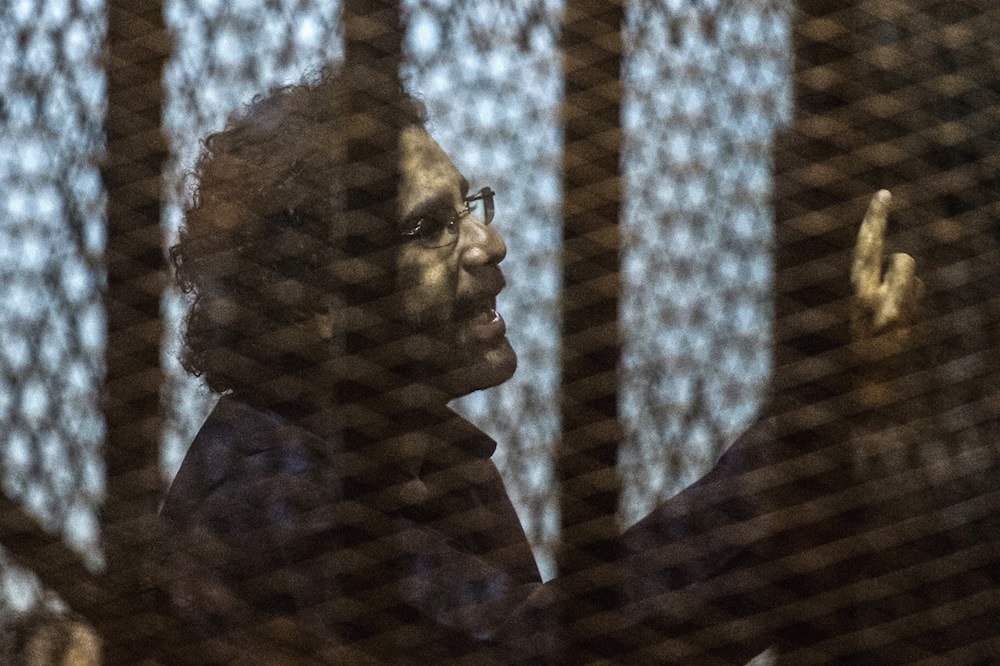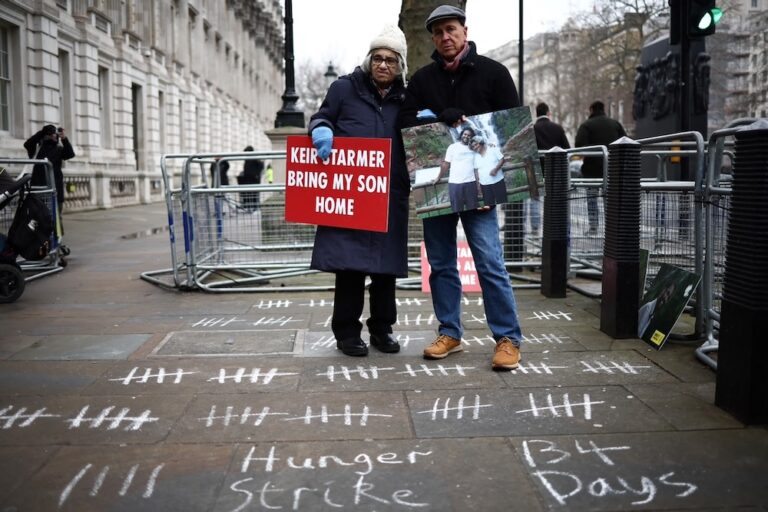Rights groups in Egypt urge President Sisi to refuse to ratify the unjust sentencing of the three activists, and reject the continued use of exceptional courts and bogus terrorism charges in retaliation against the state's peaceful critics.
This statement was originally published on cihrs.org on 21 December 2021.
The undersigned human rights organizations condemn the Emergency State Security Court’s verdict, on 20 December, of five years’ imprisonment for activist Alaa Abdel Fattah and four years in prison for human rights lawyer Mohamed El-Baqer and blogger Mohamed Ibrahim (Oxygen) in case no. 1228 of 2021. The organizations urge the President of the Republic of Egypt to refuse to ratify the verdict, while holding the Egyptian authorities responsible for the three detainees’ lives and their psychological and physical health.
The verdict confirms the Egyptian government’s continuation of its hostile policies towards human rights, despite its declaration of a human rights strategy that claims the presence of an independent judiciary and respect for human rights in the country. This ruling exposes the human rights strategy as a farce, as alleged by independent rights organizations, while also belying Sisi’s announcement that the state of emergency has been lifted in Egypt. Alongside an arsenal of repressive laws, the state of emergency remains ongoing, ensuring that the lives of these three peaceful members of Egypt’s rights community and many other prisoners of conscience waste away in prison, despite their innocence.
The verdict cannot be appealed, as it was issued by an exceptional court, and is the outcome of a prolonged and escalating campaign of violations and abuses against the three activists. For over two years, they were detained in pre-trial detention on fabricated charges in case no. 1356 of 2019, despite having exceeded the maximum legal time limit for remand. At the end of this two-year legal period, the activists were not released and were instead “recycled” into this current case, essentially copied from the first case.
The 20 December verdict was a culmination of the judiciary’s multiple and sustained failures to uphold basic due process rights, instead inflicting upon the defendants a series of violations related to the length of the investigation and trial period. The activists were referred to trial on 18 October without the knowledge of their lawyers, and the prosecution refused to inform the lawyers of the charges against them. The Emergency State Security Misdemeanors Court did not allow the defense to be heard or to consult with their clients for three sessions, nor did the court allow the defense to obtain the case file or a copy of it. Meanwhile, Abdel Fattah, El-Baqer and Ibrahim were not presented with any credible evidence of the accusations against them, only dated social media publications and supposed violations committed in prison.
The three activists have suffered from harsh conditions in prison and escalating reprisals and ill treatment, including torture, since being detained in September 2019. The court failed to give the slightest response or protection as its role, despite Mohamed El-Baqer presenting the inhumane conditions he and others face in a court session; Alaa Abdel Fattah was also deprived of his right to visitation. In November 2020, both El-Baqer and Abdel Fattah were added to the so-called “terrorists list” prompting United Nations experts to demand their release as they had been “arbitrarily detained and their rights to fair trial and due process had been violated.”
The exceptional Emergency State Security court has a disreputable record of handing down unjust verdicts against members of Egypt’s rights, academic, political, and legal communities. Researcher and graduate student Ahmed Samir was sentenced to four years by the court, and lawyer and former parliamentarian Zyad Elelaimy was sentenced to five years in prison alongside journalists Hisham Fouad and Hossam Mounes with four-year prison sentences each. Other peaceful opposition politicians and human rights activists are awaiting verdicts from the same court, including engineer Yahya Hussein Abdel Hady on 27 December, prominent politicians Abdel Moneim Aboul Fotouh and Mohammed al-Qassas, and members of the Egyptian Coordination for Rights and Freedoms.
The undersigned organizations reject the appalling 20 December ruling, which unjustly sentences to prison Mohamed El-Baqer, Alaa Abdel Fattah, and Mohamed Ibrahim. The continued use of exceptional courts and bogus terrorism charges in retaliation against the state’s peaceful opponents and critics only confirms the Sisi government’s hostile approach towards human rights, especially the right to free expression, despite its claims to the contrary when addressing the international community. Only the president’s refusal to ratify the verdict would indicate any semblance of genuine intent to respect human rights, an intent that has thus far not been evidenced in policy or practice.



